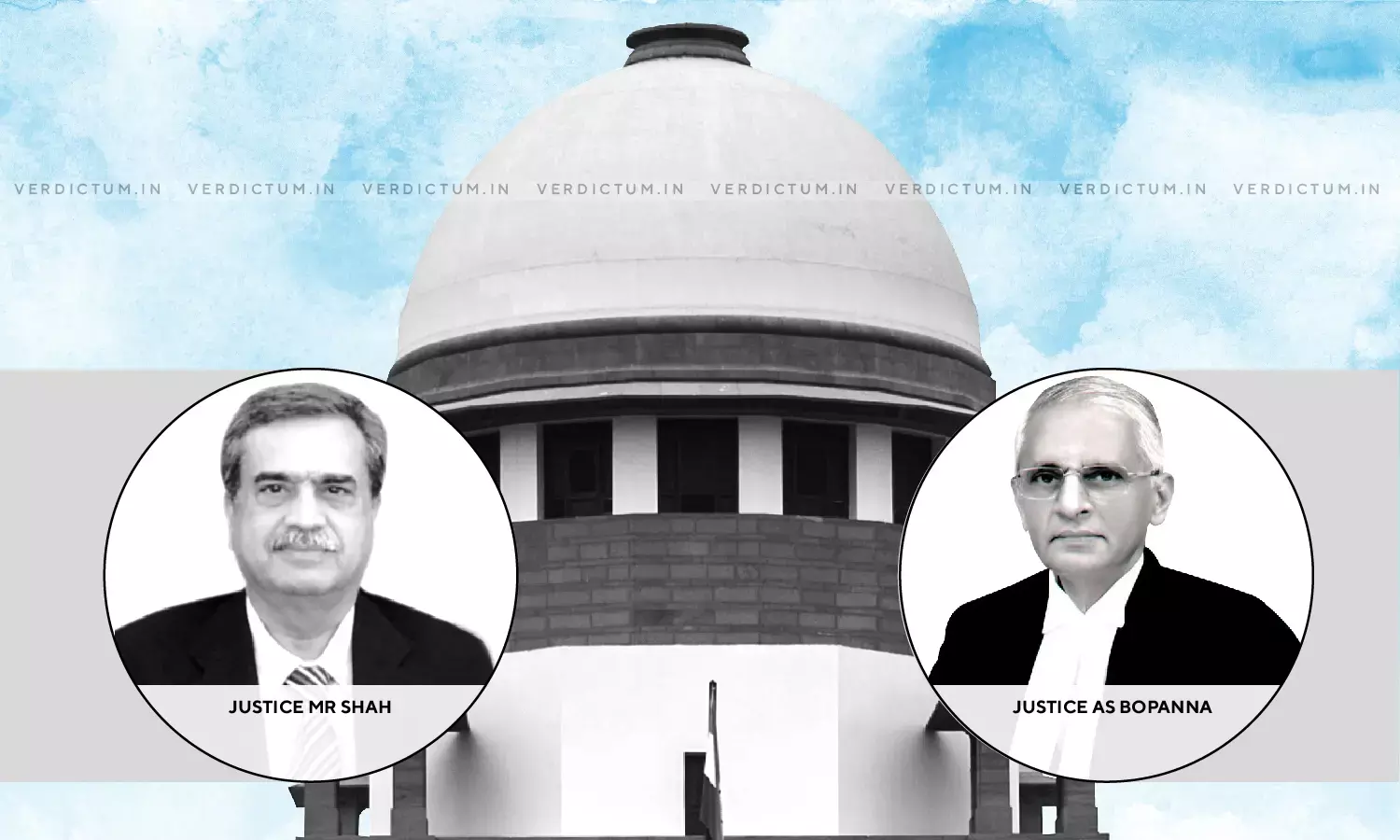Person Belonging to SC/ST In Relation To His Original State Cannot Be Deemed To Be So In Relation To Any Other State On His Migration For The Purpose Of Employment, Education Etc., SC Reiterates

A two-judge Bench of Justice M.R. Shah and Justice A.S. Bopanna was considering, in appeal, the judgment of the Division Bench of Rajasthan High Court at Jodhpur. The DB had allowed the appeal of the Respondent (Original Plaintiff). Hence, the Appellant (Original Defendant) preferred an appeal before the Apex Court.
Advocate Ms. Christi Jain appeared for the Respondent - Original Plaintiff before the Court.
The suit property was allotted to the father of the Respondent as SC landless person. The Respondent had averred that his father had borrowed Rs. 5,000/- from one Puran Singh and under the guise of documentation, Puran Singh fraudulently made Respondent's father sign the sale deed in favor of the Appellant.
A suit for ejectment was filed by Respondent's father against Puran Singh and the Appellant on the ground that the sale deed was void and ineffective and it is in violation of Section 42 of the Rajasthan Tenancy Act, 1955 and Section 13 of the Rajasthan Colonization Act.
The suit was decreed holding that the land was in possession of Puran who was not a SC person and the sale deed is in violation of the provisions above. The Appellant filed an appeal before the Revenue Appellate Tribunal. The same was dismissed.
The Appellant filed an appeal before the Board of Revenue which was allowed to give the benefit of compounding to the Appellant on payment of compounding fees under Section 13 of the Rajasthan Colonization Act.
The Respondent filed a Writ before the High Court. The Single Judge dismissed the Writ. An appeal was filed before Division Bench. The appeal was allowed holding that Appellant being resident and SC in Punjab, he could not have taken the benefit of his being SC in Rajasthan. Hence, the instant appeal by the Appellant before the Apex Court.
The issue which was dealt with by the Court was -
Whether the land transaction in favor of the Appellant - Original Defendant was illegal and in violation of Section 42 of the Rajasthan Tenancy Act, 1955 and Section 13 of the Rajasthan Colonization Act, 1954 being a person belonging to Scheduled Caste of State of Punjab?
The Court noted that the subject land was situated in Rajasthan. The Court noted that in bainama concerning the Appellant, the address was shown as District Firozpur, Punjab. The same position was reflected in the mutation record. The Court held that merely because the Appellant's grandfather and father had purchased the agricultural lands in Rajasthan, the Appellant cannot be held to be an ordinarily resident of Rajasthan.
On the question concerning the validity of the sale transaction, the Court placed its reliance upon Marri Chandra Shekar Rao Vs. Dean, Geth G.S. Medical College and Others, (1990) 3 SCC 130). It was observed in the said decision that the social condition of a State varies from State to State and it would not be proper to generalize any Caste or tribe as an SC or ST for the entire country.
The Court then relied upon the decision rendered in Action Committee on Issue of Caste Certificate to Scheduled Castes and Scheduled Tribes in the State of Maharashtra and Another Vs. Union of India and Another, (1994) 5 SCC 244. The Court held that the decision in the said case was applicable with full force to the present case and observed -
"In the case of Action Committee on Issue of Caste Certificate to Scheduled Castes and Scheduled Tribes in the State of Maharashtra and Another (supra) after considering the decision of this Court in the case of Marri Chandra Shekar Rao (supra) the question arose, Whether a person belonging to caste or tribe specified for the purpose of Constitution to be Scheduled Caste or a Scheduled Tribe in relation to State A migrates to State B, where a caste or tribe with the same nomenclature is specified for the purposes of Constitution to be a Scheduled Caste or Scheduled Tribe in relation to that State B, will that person be entitled to claim the privileges and benefits admissible to persons belonging to Scheduled Caste and /or Scheduled Tribe in State B? Holding that a person belonging to Scheduled Caste /Scheduled Tribe in relation to his original State of which he is permanent or an ordinarily resident cannot be deemed to be so in relation to any other State on his migration to that State for the purpose of employment, education etc. …"
The Court held that the Appellant belonging to Punjab and being an ordinarily and permanent resident of Punjab cannot claim the benefit of SC in Rajasthan for purpose of purchase of land belonging to SC person of Rajasthan who was the original allottee. Hence, the Judgment of the DB of the High Court was upheld and the sale transaction in favor of the Appellant was held to be in clear violation of Section 42 of the Rajasthan Tenancy Act, 1955.
The Court also noted that no order of compounding could have been passed in favor of the Appellant. Accordingly, the appeal was dismissed by the Apex Court.
Click here to read/download the Judgment

